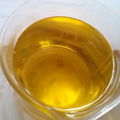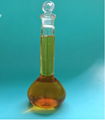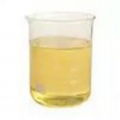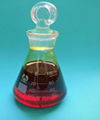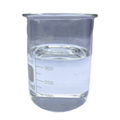| Model: | 1200A |
|---|---|
| Brand: | - |
| Origin: | Made In China |
| Category: | Chemicals / Lubricant |
| Label: | - |
| Price: |
-
|
| Min. Order: | - |
| Last Online:09 Oct, 2023 |
【Chemical Safety Technical Specification -MSDS】
Last revision date: 15 March 2023
Originally compiled: March 15, 2023
Prepared in accordance with GB/T16483-2008
SDS Number: LM-00-LM-1010-2022
Version; A3-2
|
1)Chemical and corporate identification |
|||||
|
Chinese names of chemicals |
1-2-amido/succinimide |
||||
|
Product name |
1200A |
||||
|
Product recommendation and restricted use |
As an anti-rust agent used in lubricating oil, grease |
||||
|
Manufacturer's name |
Hebei Tuofu Engry Technology Co, Ltd. |
||||
|
Address |
Tongda Road Industrial Park, Jinzhou City, Hebei Province |
Zip code |
052260 |
||
|
Enterprise emergency telephone |
0311-84317827 |
Fax NO. |
0311-85123667 |
||
|
E-mail address |
jasmine@hbtuofu.com |
||||
|
Effective date |
2023-03-15 |
||||
|
2) Risk codes |
|||||
|
GHS risk categorise |
Harmless |
||||
|
GHS label element
|
|
||||
|
Sysbol |
No coincidence |
||||
|
Risk Phrases
|
No risk phrases |
||||
|
Hazard statement |
Physical hazards: It is not classified as a hazardous substance according to GHS standards. Health hazards: It is not classified as a health hazard according to GHS standards. Environmental hazard: It is not classified as a health hazard according to GHS standards.
|
||||
|
GHS instructions for preventive measures |
|
||||
|
Preventive measures |
Free speech |
||||
|
incident response |
Free speech |
||||
|
Safe storage |
Free speech |
||||
|
Waste disposal |
Free speech |
||||
|
Other hazards that do not affect classification |
It's not rated as combustible, but it burns |
||||
|
Summary of main symptoms and emergency response |
Based on animal tests, no strong evidence has been found that the product causes cancer. Under normal circumstances, this product is not harmful to health, and excessive contact may cause irritation to the eyes, skin, breathing, etc. |
||||
|
3) Composition / composition information |
|||||
|
Name of chemical substance |
cas number or identification number |
EC serial number |
Content,wt% |
||
|
1-2-amido/succinimide |
123-56-8 |
-- |
70-75 |
||
|
White mineral oil |
8042-47-5 |
-- |
25-30 |
||
|
4) Frist aid measures |
|||||
|
General information |
Use under normal conditions should not be a health hazard. |
||||
|
Disposal of different contact modes |
|
||||
|
Suction |
No medical emergency is required. Consult a doctor if you have symptoms such as cough or dyspnea |
||||
|
Skin contact |
No medical emergency is required. Remove the contaminated clothes, wipe the contaminated parts clean, and wash with soap and water. Wash clothes and shoes thoroughly before reuse. Seek medical attention if necessary. |
||||
|
Eye con |
No medical emergency is required. Rinse with water for 15-20 minutes. Seek medical attention if necessary. |
||||
|
Ingestion |
Unless you have swallowed a large amount, there is usually no need for a medical emergency. Medical attention is recommended as a precaution. |
||||
|
Main symptoms(acute/late effects) |
No have |
||||
|
A special note to doctor |
No special first aid is required in the workplace, symptomatic treatment. |
||||
|
Advice for protecting the rescuer |
Action should not be attempted without proper protective equipment. |
||||
|
5) Fire control measures |
|||||
|
Particular risk |
This product has no explosion hazard and is not dangerous goods. In case of high heat, open flame and strong oxidant, easy to cause combustion. |
||||
|
Fire extinguishing Methods and extinguishing agents |
Sprinkler or spray, foam extinguisher, carbon dioxide extinguisher, dry powder extinguisher. Sand is suitable for small fires only. |
||||
|
Harmful substance sproduced during combustion |
May release toxic fumes. |
||||
|
Prohibited fire extinguishing agent |
Do not spray |
||||
|
Special protective equipment for fire personnel |
Breathing apparatus must be worn when approaching the point of ignition in a confined space. |
||||
|
6) Emergency treatment of leakage |
|||||
|
Avoid contact with spilled or released substances. For guidance on the selection of personalprotectiveequipment, see Chapter 8 of the Safety Technical specification. For handling information, see Chapter 13 of the Safety Technical specification. Please comply with all applicable local or national regulations. |
|||||
|
Emergency procedure |
Cut off the fire source, immediately contact the operator, let unrelated personnel quickly evacuate to a safe area and isolation. Cut off the source of leakage as much as possible to prevent it from entering the sewers, drains, water bodies and other Spaces. Follow relevant fire procedures, refer to Chapter 8 of the Safety Technical manual |
||||
|
Protective measures for operators |
Avoid contact with skin and eyes |
||||
|
Environmental protection measures |
Before arriving at the site, the operator should try to limit the spilled material. For a small amount of leakage, use wood chips, sand, soil or other adsorbents to collect the spill and place it in a closed, leak-proof container for treatment; For large spills, build embankments or dig pits to collect them and ensure that they do not enter sewers, rivers, water sources and lowlands.Dispose of spills in appropriate containers. If there is pollution to soil and plants, report to the relevant authorities. The disposal of waste is referred to Chapter 13 of the safety technical specification. |
||||
|
Elimination method |
A large amount of leakage is pumped into the container with a vacuum pump, and a small amount of leakage can be prevented by wood chips, sand, soil, oil absorbing cotton or other adsorbents and put into a sealed container for treatment. Land leakage, take protective measures to cut off the source of pollution, to minimize the pollution of surface water. Water spills, immediately stop the loss of oil with oil lines, warn nearby vessels, and use appropriate dispersants if necessary. Serious spills that cannot be addressed should be reported to local authorities. |
||||
|
7) Operation, disposal and storage |
|||||
|
Operation disposal |
|
||||
|
General precautions |
Avoid prolonged or repetitive contact with the skin and wash thoroughly after contact. If there is a risk of inhaling steam, spray or smoke, use a local exhaust ventilator. When handling, light loading and unloading should be done to prevent damage to packaging and containers. |
||||
|
Precautions for safe disposal |
Operators must be specially trained and strictly abide by the operating rules. Avoid contact with oxidants. Equipped with the corresponding number of fire equipment and leakage emergency treatment equipment. Protective shoes should be worn when loading and unloading 200-litre barrels of products. Empty containers may have harmful residues. |
||||
|
Storage condition |
Keep containers sealed and do not store in open or unlabeled containers. Storage conditions should be cool, dry, ventilated, away from strong oxidants, tinder, heat sources and flammable materials. Store at room temperature. Empty containers may still have some products, do not cut, welding, do not expose to high temperature, flame. |
||||
|
8) Contact control and personal protection |
|||||
|
Allowable concentration |
No further information is available. |
||||
|
Engineering control method |
Provide exhaust ventilation or other engineering controls to ensure adequate ventilation. |
||||
|
Personal protective equipment |
Personal protective equipment shall comply with relevant national standards. For details, consult your personal protective equipment supplier. |
||||
|
Respiratory system Protection |
Respiratory protection is not required under normal conditions of use. When ventilation is insufficient, choose a respiratory protection device that meets the requirements of relevant regulations. For details, consult the supplier of respiratory protection equipment. |
||||
|
Hand guard |
Use oil - and chemical-resistant protective gloves. Nitrile rubber, neoprene rubber, and PVC gloves are recommended. Replace contaminated gloves promptly. Wash thoroughly with soap and water after operation. |
||||
|
Eye guard |
If splashing is possible, use safety glasses. |
||||
|
Skin and body protection |
Under normal conditions of use, no special skin and body protective equipment is required in addition to ordinary work clothes. When there is the possibility of spatter, please choose suitable and permeable safety clothing and safety shoes according to the actual situation of the workplace, the recommended material is nitrile rubber. |
||||
|
9) Physical and chemical characteristics |
|||||
|
Appearance |
Brown red clear viscous liquid |
||||
|
Smell |
Odeur ammonicale |
||||
|
PH |
Alkalescence |
||||
|
Melting point |
Not applicable |
||||
|
Freezing point |
Non-available |
||||
|
Boiling piont |
>300℃ |
||||
|
Flash point |
190℃(Open cup) (typical value) |
||||
|
Flammability (solid, gas) |
Non-available |
||||
|
Explosion limits |
Non -available |
||||
|
vapour pressure |
Non -available |
||||
|
vapor density |
Non -available |
||||
|
Density |
0.85 g/cm3(20℃) |
||||
|
solubleness |
Non -available |
||||
|
Octanol/water partition coefficient |
Non -available |
||||
|
Autoignition temperature |
Non -available |
||||
|
Decomposition temperature |
Non -available |
||||
|
Radioactivity |
Deny |
||||
|
10) Stability and reactivity |
|||||
|
stability |
stability |
||||
|
reactiveness |
This product is not reactive under normal conditions of use, storage and transportation |
||||
|
Dangerous reaction |
There are no known hazardous reactions under normal conditions of use |
||||
|
Condition to be avoided |
Extreme temperatures, sun exposure, exposure to strong oxidants, ignition sources |
||||
|
Ban the match |
strong oxidant |
||||
|
Hazardous decomposition product |
No dangerous decomposition forms under normal storage conditions |
||||
|
11) Toxicology information |
|||||
|
acute toxicity |
In acute oral toxicity test (one maximum test), the LD50 of both female and male rats was greater than 5000mg/kg, which was relatively non-toxic. In acute percutaneous toxicity test (one maximum test), the LD50 of both female and male rats was greater than 2000mg/kg, indicating that the rats were actually non-toxic. |
||||
|
Skin irritation or corrosion |
Expect to feel mild irritation. Prolonged or continuous contact with the skin without washing may cause skin irritation. |
||||
|
Eye irritation or corrosion |
Expect to feel mild irritation. |
||||
|
Inhalation hazard |
Inhaling steam or oil mist may cause mild irritation. |
||||
|
Respiratory or skin allergies |
It is not expected to be a skin sensitizing substance |
||||
|
Germ cell mutation |
There is no risk of mutagenesis |
||||
|
carcinogenicty |
Not considered carcinogenic |
||||
|
Reproduction toxicity |
No expected harm |
||||
|
Specific target organ system toxicity - one time exposure |
No expected harm |
||||
|
Specific target organ system toxicity - repeated exposure |
No expected harm |
||||
|
extraneous information |
According to laboratory studies using the same or similar materials, under normal use conditions, it is not considered to cause major health effects. It does not induce mutation in the organism or is not toxic to inherited genes. No sensitization in animal or human tests. |
||||
|
12) Ecological information |
|||||
|
Ecotoxicity |
This product is not considered harmful to aquatic organisms and is not harmful to the environment in the long term. |
||||
|
Durability and degradability |
It is not expected to biodegrade easily |
||||
|
Potential bioaccumulation |
No further information is available. |
||||
|
Migration in soils |
If it enters the soil, it will be absorbed by soil particles and cannot flow. |
||||
|
13) Waste disposal |
|||||
|
Residual waste |
Where possible, it should be recovered or recycled, or centrally disposed of by a waste collector approved by relevant legislation. |
||||
|
Disposal of containers |
Disposal should, as far as possible, be carried out by waste collectors who are approved by the relevant regulations. |
||||
|
Disposal considerations |
Please use personal protective equipment. Keep waste from contacting soil or flowing into drains. Use transport, recycling, treatment or storage equipment approved by the authorities for waste turnover or storage. |
||||
|
14) Transportation information |
|||||
|
This product is not classified as a hazardous substance during land, sea and air transport |
|||||
|
UN dangerous goods number |
Not applicable |
||||
|
UN shipping name |
Not applicable |
||||
|
UN classification of dangerousness |
Not applicable |
||||
|
Packaging group |
Not applicable |
||||
|
Marine pollutant |
Not applicable |
||||
|
15) Regulatory information |
|||||
|
According to the relevant laws and regulations of China, this product is not classified as a dangerous chemical. |
|||||
|
Domestic chemical safety management regulations |
Regulations on the Safety Administration of Hazardous Chemicals (Promulgated by The State Council on December 7, 2013) Regulations on the Safe Use of Chemicals in the Workplace ([1996] Ministry of Labor No. 423) List of Existing Chemical Substances in China Catalogue of Hazardous Chemicals (2015 Edition) GB/T 16483-2008 Chemical safety technical specification content and project sequence GB 13690-2009 General Rules for classification and Risk publicity of chemicals GB 15258-2009 Regulations for the preparation of chemical safety labels Hazardous factors in the workplace - Occupational exposure limits - Part 1: Chemical hazardous factors |
||||
|
16) Other data or data |
|||||
|
revision date |
March 15, 2023 |
||||
|
MSDSversion number |
A3-2 |
||||
|
other material |
Additional information and manuals are available through sales and technical services |
||||
|
Revision declaration
|
The information in this MSDS applies only to the specified product and does not apply to mixtures of this product with other substances unless otherwise specified. This MSDS is intended f or use by appropriately trained users of the product. The user of this MSDS must make an independent judgment as to the suitability of this MSDS under special conditions of use. In the case of special use, the author of this MSDS shall not be liable for any injury caused by the use of this MSDS. |
||||

